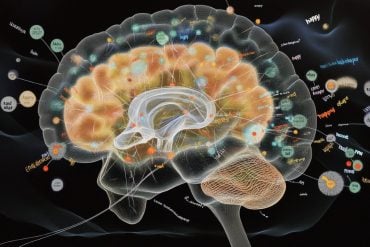Summary: Study reveals a correlation between the composition of the gut microbiome and behavioral and cognitive performance in mice with Alzheimer’s related genes.
Source: Oregon Health and Sciences University
New research in mice published today in the journal Scientific Reports strengthens the growing scientific consensus regarding the role of the gut microbiome in neurodegenerative disorders including Alzheimer’s disease.
The study, led by researchers at Oregon Health & Science University, found a correlation between the composition of the gut microbiome and the behavioral and cognitive performance of mice carrying genes associated with Alzheimer’s. The mice carried the human amyloid precursor protein gene with dominant Alzheimer’s mutations generated by scientists in Japan.
The study further suggests a relationship between microbes in the digestive tract and the expression of genes that trigger Alzheimer-like symptoms in mice.
“You know the expression, ‘You are what you eat?'” said senior author Jacob Raber, Ph.D., professor of behavioral neuroscience in the OHSU School of Medicine. “This may be part of that. While all mice were fed the same diet, the gut microbiome is affected in a genotype-dependent fashion and this in turn might affect your brain.”
The findings are the first to demonstrate a direct connection between the gut microbiome and cognitive and behavioral changes in an Alzheimer’s disease animal model, and they are consistent with a recently published observational study in people newly diagnosed with Alzheimer’s. In fact, a U.S. clinical trial for the treatment of mild to moderate Alzheimer’s disease is currently underway involving a compound that targets microbes in the gut.
The research published today breaks new ground.
In addition to the cognitive and behavioral changes that were measured, the study is the first to demonstrate a relationship between changes in the gut microbiome and epigenetic changes in neural tissue in the hippocampus, an area of the brain affected in Alzheimer’s. This type of research is not possible in people.
The microbiome is a complex assemblage of microorganisms such as bacteria that play a critical role in a wide range of functions in the body. In this case, researchers wanted to see if the gut microbiome affected cognitive and behavioral measures in specially bred mice at 6 months of age. So they compared wild-type mice with those genetically engineered to carry the human amyloid precursor protein gene with dominant Alzheimer’s mutations.
They found changes in the gut microbiome – measured in fecal pellets – corresponded with epigenetic regulation of the apolipoprotein E and Tomm40 genes, both associated with Alzheimer’s. They found a clear correlation, but they still can’t say whether one causes the other.

“Microbes may elicit an impact on behavioral and cognitive measures relevant to Alzheimer’s disease via epigenetic changes in the hippocampus,” Raber said. “Or, alternatively, it might be that the epigenetic changes in the hippocampus affect changes in the gut microbiome.”
The next phase of research will determine whether it’s possible to reduce Alzheimer’s-like symptoms in genetically predisposed mice by altering their diet.
“The exciting part of this is that you can manipulate the gut microbiome,” Raber said. “We can use probiotics and see what the effect is.”
Co-authors from the Raber lab included postdoctoral fellow Payel Kundu, Ph.D., former graduate student Eileen Ruth S. Torres, Ph.D., and Sarah Holden. Raber collaborated on the research with Thomas Sharpton, Ph.D., an Oregon State University scientist who specializes in microbiome studies, and Lucia Carbone, Ph.D., an OHSU scientist who directs the Knight Cardiovascular Institute’s Epigenetics Consortium, and members of their laboratories.
The special Alzheimer’s mutant mice were generated by Takashi Saito, Ph.D., and Takaomi Saido, Ph.D., of Nagoya City University and the RIKEN Center for Integrative Medical Sciences, respectively, in Japan.
Funding: This research was supported by the National Institutes of Health, awards R56AG057495-01, RF1AG059088, R01ES030226, R21AG065914, T32AG055378 and T32ES007060.
About this Alzheimer’s disease research news
Source: Oregon Health and Sciences University
Contact: Erik Robinson – Oregon Health and Sciences University
Image: The image is in the public domain
Original Research: Open access.
“Integrated analysis of behavioral, epigenetic, and gut microbiome analyses in AppNL-G-F, AppNL-F, and wild type mice” by Payel Kundu, Eileen Ruth S. Torres, Keaton Stagaman, Kristin Kasschau, Mariam Okhovat, Sarah Holden, Samantha Ward, Kimberly A. Nevonen, Brett A. Davis, Takashi Saito, Takaomi C. Saido, Lucia Carbone, Thomas J. Sharpton & Jacob Raber. Scientific Reports
Abstract
Integrated analysis of behavioral, epigenetic, and gut microbiome analyses in AppNL-G-F, AppNL-F, and wild type mice
Epigenetic mechanisms occurring in the brain as well as alterations in the gut microbiome composition might contribute to Alzheimer’s disease (AD). Human amyloid precursor protein knock-in (KI) mice contain the Swedish and Iberian mutations (AppNL-F) or those two and also the Arctic mutation (AppNL-G-F). In this study, we assessed whether behavioral and cognitive performance in 6-month-old AppNL-F, AppNL-G-F, and C57BL/6J wild-type (WT) mice was associated with the gut microbiome, and whether the genotype modulates this association.
The genotype effects observed in behavioral tests were test-dependent. The biodiversity and composition of the gut microbiome linked to various aspects of mouse behavioral and cognitive performance but differences in genotype modulated these relationships. These genotype-dependent associations include members of the Lachnospiraceae and Ruminococcaceae families. In a subset of female mice, we assessed DNA methylation in the hippocampus and investigated whether alterations in hippocampal DNA methylation were associated with the gut microbiome. Among other differentially methylated regions, we identified a 1 Kb region that overlapped ing 3′UTR of the Tomm40 gene and the promoter region of the Apoe gene that and was significantly more methylated in the hippocampus of AppNL-G-F than WT mice.
The integrated gut microbiome hippocampal DNA methylation analysis revealed a positive relationship between amplicon sequence variants (ASVs) within the Lachnospiraceae family and methylation at the Apoe gene. Hence, these microbes may elicit an impact on AD-relevant behavioral and cognitive performance via epigenetic changes in AD-susceptibility genes in neural tissue or that such changes in the epigenome can elicit alterations in intestinal physiology that affect the growth of these taxa in the gut microbiome.






